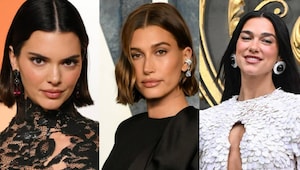5 Female Musicians Who are Hitting All the Right Notes
Breaking the glass ceiling one earworm at a time, meet the female musicians making new-age India sit up and take notice—even dance to their tunes.
By undefined
23 January, 2020
Breaking the glass ceiling one earworm at a time, meet the female musicians making new-age India sit up and take notice—even dance to their tunes.

1_mg_9956k.jpg1. Aarifah Rebello
(Drummer, singer, songwriter, and guitarist)
“While many women are excelling in the music industry, in various capacities, the truth is that we live in a patriarchal country and music is still not considered a profession. There’s a lot of talent, but it gets swept under the rug. I belong to a musically-inclined family, but even my mum insisted that I get a formal degree first, so I took up journalism in college before turning pro. I’ve had people ask me, ‘You want to be a musician? But how’s that going to support you?’. It’ll take us some time to break that mindset—but it is happening. Also, people are surprised to see a woman play the drums. I think most expect women to be singers, not play the instruments. Sometimes, before I get on a stage, I can sense apprehension in the air—they underestimate my skills as a drummer because of my gender. And at the end of the performance, they come up and say, ‘Oh you play well’. I’ve been playing for 10 years now, and I still get the same reaction—they wait to see me perform before they are convinced that I can actually play the drums, and am good, too!”

2musicians.jpg2. Hanita Bhambri
(Singer and songwriter)
“You’d think once you’ve released an album and have some work to show, things will get easier, but it’s not like that. You can be creative, talented, experienced...but none of it matters if it doesn’t translate into money. The profession can be a bit daunting like that. You’re making investment after investment, but there are no returns in the near future. I have to double as a music teacher to stay afloat. Sure, people can like your work, follow you on social media, but that doesn’t mean they’re buying your album or tickets to your shows. Also, if your songs are in English, it becomes even harder to sell. People in India love Bollywood. And, apparently, an Indian singing in English is ‘not authentic’, so they should stick to Hindi! Then there’s the gender bias. Look at the headliners at music festivals in India—they’re predominantly men. In fact, a huge festival last year didn’t have a single female artist! If you raise your voice against the discrimination, you’re either ridiculed or ostracised. Sometimes, even women pull women down, because of petty competition and jealousy. Even with the audience, you have to be careful. Once a guy almost kissed me while I was performing. Another time, a male journalist called to interview me, and started asking really uncomfortable questions. You have to keep your guard up all the time!”

3musicians2.jpg3. Anisha Uppal
(Pianist, singer, and songwriter)
“I’m just starting out, so it is difficult—getting good gigs, feeling a sense of achievement from them, and the financial aspects of releasing an album. But I’m no longer anxious before a performance. I can shrug off a mistake and laugh at myself a little more. If you’re very hard on yourself, it’s tough to take risks. And if you don’t take risks, you won’t grow. On the other hand, if you’re too easy on yourself, you can get complacent, and that can hamper your growth, too. Piano is my first love. Sadly, you can’t transport it easily, and most venues don’t have one. It’s one of my biggest grievances. Also, it’s not common to see people using the piano to accompany their voice or songwriting—especially those who specialise in playing it. I think the more acquainted you get with the piano, the harder it gets—because you realise just how much you can do with it! The piano opens up a whole library of musical ideas to me. Also, at the end of the day, what matters to me the most is the ability to blow someone away...and gender has nothing to do with that.”

4musicians3.jpg4. Meera Desai
(Singer and Songwriter)
“I use everything—my life, things I see or imagine around me, other artists—as inspiration. I carry a small journal with me at all times, and whenever an idea starts to form, I jot it down. It eventually culminates into poetry or song. When I began working on my first EP (Extended Play), it was also the first time I was collaborating with someone in the professional sense. I hadn’t studied music in college—I trained in western vocals, but hadn’t learnt theory; nor was I a formally-trained instrumentalist. Because of this, I was starting to feel inferior, and it was affecting my ability to create music. But I found a way to spin it around—by learning at every opportunity, instead of beating myself up. I’m also focusing on other areas, like scheduling my time between writing and programming gigs, collaborating with other artists, continuing to learn Hindustani music, having a social life, and spending time with family. Also, on how to make money doing things I want to, when to compromise, and when to do work without letting it affect my musical integrity. It can be testing.”

5musicians4.jpg5. Sanjeeta Bhattacharya
(Singer and Songwriter)
“When I was starting out, I’d say yes to pretty much anything that came my way. It was mostly ‘cover gigs’ or renditions of other people’s works. Once I decided that I will only perform original content, offers decreased drastically. There aren’t many venues in the country that let you play your own music; nor managers who can support and promote you in that area. Another problem in the Indian music industry is that it doesn’t encourage indigenous talent—people who sing in local dialects. There are a tonne of talented musicians, making great music in their own languages, but they aren’t given their due. As a woman, there have been unwelcome advances from men, too. Once, a very well-known musician thought he could have his way with me...and when I objected, he completely cut me off! There’s a lot of male ego, and this attitude of ‘It’s okay, yeh kuch nahi bolegi’. Also, women can very b*tchy as audience members. At performances, I’ve had them stare at me from head to toe, in the oddest, most scrutinising way, while the men were more encouraging.”
Comment
more from Celebrity

Lit Christmas gifts that deserve a spot on every book lover’s shelf

Statement earrings you need to complete your perfect holiday fit

Silver going out tops that are your VIP pass to the dance floor

The little white dresses that are about to become your holiday-season power staples

Tweed bags are the official holiday accessory to own—and these are the ones to get stat
